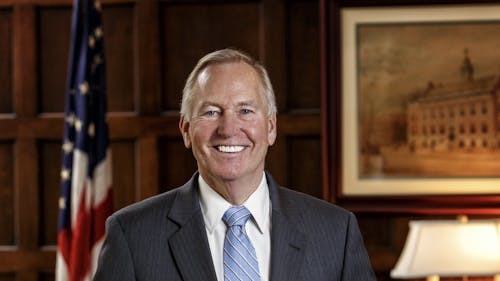New Brunswick mayor speaks at RUSA town hall

This past Thursday, the Rutgers University Student Assembly hosted a town hall with New Brunswick Mayor James Cahill, in which he discussed topics including transportation, violent crime and access to essential services in the city.
Cahill has served as New Brunswick’s mayor for the past 31 years and recently won reelection in November for his ninth consecutive term since 1991.
During the town hall, he first discussed crime statistics and policies in New Brunswick and said that the city has experienced a 73 percent decrease in crime during his tenure as mayor.
Cahill said there is a multitude of reasons for the drop in crime, including collaborations with the Rutgers University Police Department (RUPD).
These initiatives include New Brunswick law enforcement patrolling with RUPD near campus, installing video surveillance cameras around the city and using a notification system that alerts approximately 25,000 individuals to emergency issues, he said.
"We've implemented a shared services agreement with (the RUPD), combining our emergency dispatch services, otherwise known as 911," Cahill said. "These are just some of the things that we've done over the past number of years."
In addition to these efforts, he said New Brunswick has been involved in a national plan to reduce firearm access and drug use in communities.
The New Brunswick Police Department (NBPD) headquarters offers a drug drop box where residents can dispose of unwanted or outdated drugs to reduce potential abuse, Cahill said. In October, the NBPD co-sponsored a gun buyback event that allowed residents to trade their firearms for cash anonymously.
"At that event, individuals were able to anonymously turn in their firearms and get paid for up to three guns," he said. "Over 600 guns were turned in that day."
In New Brunswick, the number of gunshot victims has reduced from 41 to 16, and the number of gun-related incidents has decreased from 34 to 14, since last year, Cahill said.
Later in the town hall, the mayor spoke about public transportation and addressed issues with traffic, vehicle carbon emissions and scooter use around the city.
"The city of New Brunswick is a 'complete streets' community," Cahill said. "The benefits of that are intended to help improve safety for pedestrians, bicyclists, children, older citizens, non-drivers and those that are mobility challenged, as well as those who cannot afford a car or choose to live car-free."
He said the city continues to prioritize sustainable infrastructure, with its master plan detailing programs that will install electric vehicle charging stations and solar panels as well as construct green spaces like parks. Additionally, New Brunswick plans to invest $40 million into improving the quality of the city’s drinking water, Cahill said.
Currently, the city is designing the $49 million expansion of the New Brunswick train station, and he anticipates construction to begin within the next three years.
In terms of traffic development near the train station, the current construction taking place on Easton Avenue leading into Albany Street will transition the area into a four-way intersection to decrease congestion. The project will likely be completed within the next two weeks, he said.
The town hall transitioned into a question-and-answer segment where Cahill responded to student questions submitted via Google form prior to the event.
Upon being asked about whether he plans to expand access to reproductive and family planning services in New Brunswick, Cahill mentioned the city’s existing Planned Parenthood location and services offered by Robert Wood Johnson University Hospital.
"The city continues to be very much a place where people who are looking for those types of services will be able to obtain them without any difficulty that might be experienced in other parts of the country," he said.
After the mayor’s response, an unidentified individual approached the microphone and said they submitted this question with greater context than what had been asked. It is not known whether this person is affiliated with Rutgers.
After noting Cahill’s lack of attendance at reproductive rights rallies in New Brunswick, the individual said the mayor’s response did not address the fact that the city’s Planned Parenthood clinic has inadequate wait times and is difficult to commute to given its location at the edge of the city.
"I use public transportation. I am low-income. I don't have a car, and I have to take an Uber or Lyft to get (to Planned Parenthood). So, I can't take any of the public transportation lanes that run through the city to there," they said.
In response, Cahill said that he was not aware of the aforementioned rallies and that his lack of attendance does not signal a lack of support for their cause.
He said the individual was the first person who had pointed out the current lack of access to reproductive services in the city and will discuss the matter with professionals to address this shortcoming.
"Now that (the unidentified individual has) mentioned it to me, it is something that I will do, starting tomorrow, and talk to those people who are involved as service providers in those areas and see if there is a need to expand and, if so, coordinate and facilitate opportunities so that people will not have a lack of service that they need, that they are entitled to," he said.



